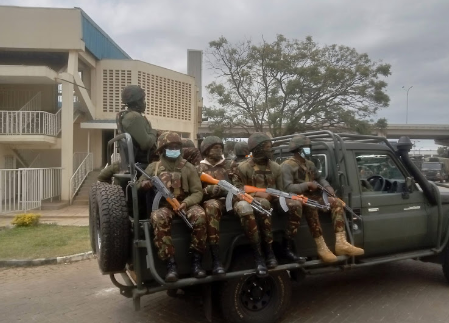High Court Judge Lawrence Mugambi is reviewing a case regarding the deployment of the Kenya Defence Forces (KDF). The case was filed by the Law Society of Kenya (LSK), and during the hearing, Judge Mugambi posed questions to both parties to better understand the legality and justification of the deployment of KDF.
Specifically, he asked LSK to comment on instances when KDF may be deployed, referring to Article 241 of the Constitution, which outlines the role and deployment conditions of the defence forces in Kenya.
“There are two situations when KDF can be deployed. One instance is when there’s there’s an emergency or disaster and the other situation is when there’s unrest,” said LSK led by Faith Odhiambo, who is the body’s president.
Based on Article 241 of the Constitution, subsections (b) and (c) outline specific conditions under which the Kenya Defence Forces (KDF) may be deployed.
Subsection (b) allows for deployment to assist and cooperate with other authorities in emergencies or disasters, with a requirement to report to the National Assembly. Subsection (c) permits deployment to restore peace in areas affected by unrest or instability, but only with approval from the National Assembly.
During the court hearing, the Law Society of Kenya (LSK) informed Justice Mugambi that the state had not provided clear information on whether the presence of the military in the capital city was in response to an emergency, unrest, or instability.
This lack of clarity raised concerns regarding the lawful grounds and justification for the deployment of KDF, prompting the judge to seek further clarification and examination of these issues.
“You have not been told anywhere there’s been unrest,” said LSK.
“In this case, what happened was that CS Duale issued the gazette notice before approval was sought. That was in breach of the constitution and should be stopped,” said LSK.
The Law Society of Kenya (LSK) argued during the court proceedings that the notice authorizing the deployment of the Kenya Defence Forces (KDF) should have been issued within 24 hours after parliamentary approval. However, LSK contended that parliamentary approval was sought after KDF had already been deployed, suggesting a procedural lapse.
In defense, the state, represented by Attorney General Emmanuel Bitta, asserted that the gazette notice issued by CS Hassan Duale was lawful and timely. According to the state’s argument, the notice was issued within the required 24-hour period after parliamentary approval.
Therefore, the state maintained that there was nothing illegal about the notice and urged the court not to grant the orders sought by LSK, implying that the deployment of KDF was conducted in accordance with legal procedures and timelines.
“In current circumstances, you haven’t been told what will happen if orders are issued. LSK can’t authoritatively comment on the issue of security,” he said
“If we endanger the lives of citizens in this country. What’s the remedy? Will order protect the right to life and property or not?” he posed
As he submitted this, the judge asked:
“Why do you think parliament must grant approvals or a report made to parliament when it comes to deployment of military and not other service?”
“It’s a supervisory mechanism. These are polycentric issues,” Bitta responded.
However. the LSK insisted that parliament’s permission was only sought after deployment.
“Any powers exercised must be within parameters of the constitution. There should have been certain procedures and should have been followed before the notice was issued,” said LSK.
The court will deliver a ruling at 3 pm on whether it will issue orders stopping the deployment of military officers in regards to the gazette notice issued by Duale.



